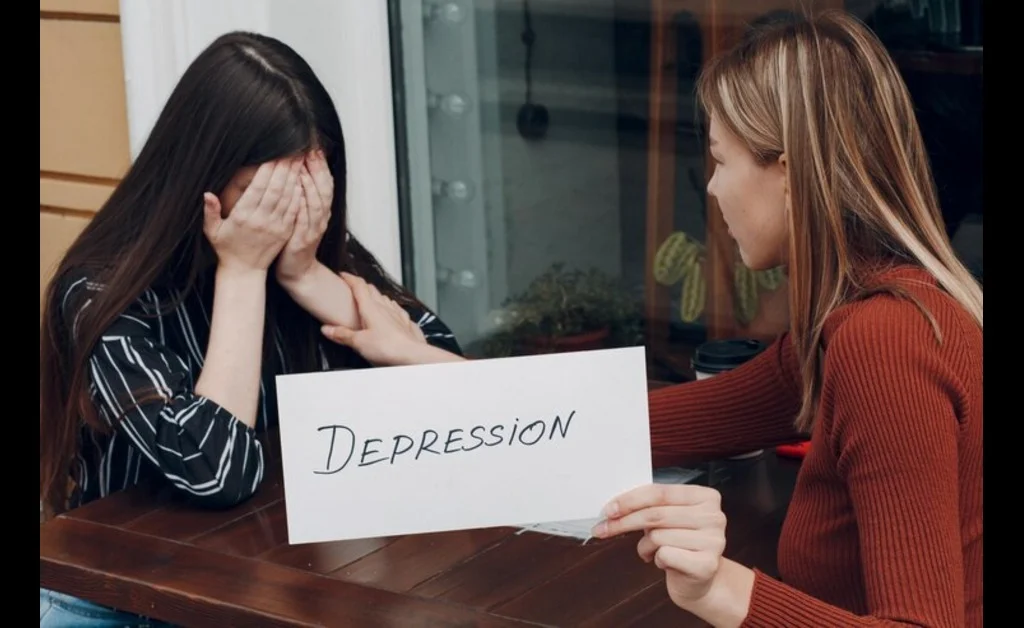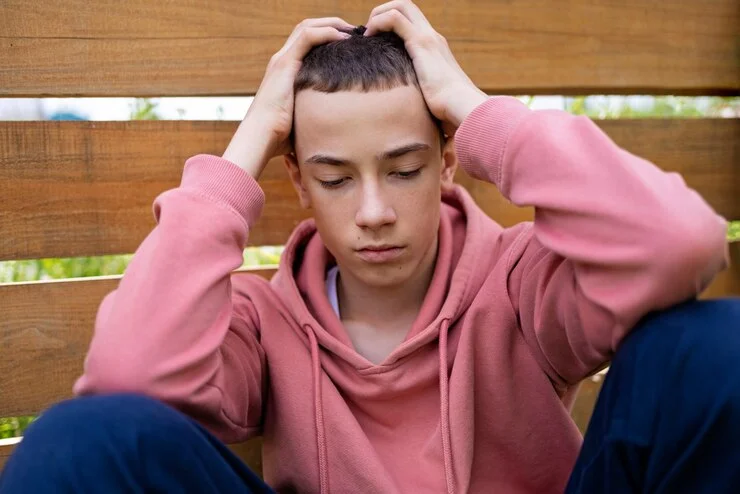Introduction
Depression is more than just feeling sad or blue. It’s a serious mental health condition that can have a major impact on your life, affecting your mood, thoughts, behaviors, and even physical well-being. Many people struggle to recognize the signs of depression, often dismissing them as a temporary funk or a natural part of life’s ups and downs. However, ignoring the symptoms of depression can be detrimental, as the condition tends to worsen without proper treatment and support.
In this comprehensive guide, I’ll draw from my personal experience and expertise to help you understand the key signs and symptoms of depression. By the end, you’ll have a better grasp of whether what you’re experiencing could be depression, and what steps you can take to seek help and find relief.
What is Depression, Really?
Before we dive into the signs and symptoms, let’s define what we mean by “clinical depression.” Depression is not just occasional sadness or feeling down; it’s a persistent and overwhelming sense of hopelessness, emptiness, and despair that can last for weeks, months, or even years if left untreated.
Clinical depression is a diagnosable mental health condition that affects a person’s mood, thoughts, behaviors, and overall well-being. It’s a complex disorder that can have various underlying causes, including biological factors (such as brain chemistry imbalances or hormonal changes), environmental factors (like stress, trauma, or major life events), and even genetic predisposition.
It’s important to note that depression is a treatable condition, and seeking professional help is crucial for managing its symptoms and regaining a sense of joy and fulfillment in life.
Common Symptoms of Depression
Depression can manifest itself in various ways, and no two people may experience it identically. However, there are some common signs and symptoms that can indicate the presence of depression:
Emotional and Psychological Symptoms
- Persistent feelings of sadness, emptiness, or hopelessness: These feelings can last for most of the day, nearly every day, and may seem overwhelming and inescapable.
- Loss of interest or pleasure in activities once enjoyed: Hobbies, social gatherings, or even simple tasks that used to bring you joy may no longer hold any appeal.
- Feelings of worthlessness or excessive guilt: You may constantly criticize yourself and feel like a burden to others, even when there’s no rational basis for these feelings.
- Difficulty concentrating or making decisions: Depression can make it challenging to focus, think clearly, or make even the simplest of choices.
- Recurrent thoughts of death or suicide: In severe cases, depression can lead to thoughts of self-harm or suicide. If you or someone you know is having suicidal thoughts, it’s crucial to seek immediate professional help.
Physical Symptoms
Depression can also manifest in physical symptoms, including:
- Significant weight loss or gain: Changes in appetite can lead to unintentional weight fluctuations.
- Sleep disturbances: Insomnia or oversleeping are common symptoms of depression.
- Fatigue and lack of energy: Even simple tasks can feel overwhelming and draining when you’re depressed.
- Unexplained aches, pains, headaches, or cramps: Depression can cause physical discomfort or exacerbate existing conditions.
Social and Behavioral Changes
Depression can also affect your social interactions and behaviors, leading to:
- Social withdrawal and isolation: You may start to avoid social situations or even close friends and family members.
- Irritability or restlessness: Depression can make you feel constantly on edge, easily agitated, or unable to relax.
- Substance abuse: Some individuals may turn to alcohol or drugs as a way to cope with or self-medicate their depression.
It’s important to remember that everyone experiences depression differently, and you may not exhibit all of these symptoms. However, if you’re experiencing several of these signs for an extended period, it’s worth seeking professional help to determine if you’re suffering from clinical depression.
Depression Across Age Groups
Depression can affect people of all ages, but the signs and symptoms may present differently depending on the age group. Here’s a closer look at how depression can manifest in different stages of life:
Children and Teenagers
In children and adolescents, depression can often be overlooked or mistaken for typical mood swings or rebellious behavior. However, some common signs of depression in young people include:
- Frequent sadness, irritability, or mood swings
- Loss of interest in activities or hobbies they once enjoyed
- Significant changes in appetite or sleep patterns
- Poor academic performance or attendance
- Social withdrawal or conflicts with peers
- Physical complaints like headaches or stomachaches
- Substance abuse or risky behaviors
If you notice these signs in a child or teenager, it’s crucial to seek professional help, as early intervention can be instrumental in managing depression and preventing long-term consequences.
Adults
In adults, depression can present in various ways, including the classic symptoms mentioned earlier, as well as:
- Difficulty managing daily responsibilities at work or home
- Relationship problems or conflicts
- Physical health issues exacerbated by depression
- Increased use of alcohol or drugs as a coping mechanism
It’s important to note that men and women may experience depression differently. Men are more likely to exhibit irritability, anger, or engage in risky behaviors, while women may experience more pronounced feelings of sadness, guilt, or worthlessness.
Older Adults
Depression in older adults is often overlooked or misdiagnosed as a natural part of aging. However, it’s a serious condition that requires attention and treatment. Signs of depression in older adults can include:
- Persistent sadness or feelings of hopelessness
- Loss of interest in activities or social interactions
- Sleep disturbances or changes in appetite
- Cognitive changes, such as memory problems or confusion
- Physical complaints or unexplained aches and pains
- Social withdrawal or isolation
It’s essential to recognize and address depression in older adults, as it can significantly impact their quality of life and overall well-being.
When to Seek Professional Help
If you’ve been experiencing several of the symptoms mentioned above for more than two consecutive weeks, it’s advisable to seek professional help. Depression is a treatable condition, and early intervention can be crucial in managing its symptoms and preventing further deterioration of your mental and physical health.
Additionally, if you’re having thoughts of self-harm or suicide, it’s imperative that you seek immediate professional help or reach out to a trusted friend or family member. These thoughts should never be ignored, as they can be a sign of severe depression that requires urgent attention and support.
Remember, there’s no shame in seeking help for depression. It’s a legitimate medical condition, and addressing it is a sign of strength and self-care, not weakness.
Causes and Risk Factors of Depression
Depression can have various underlying causes and risk factors, which can be broadly categorized into biological, environmental, and genetic factors.
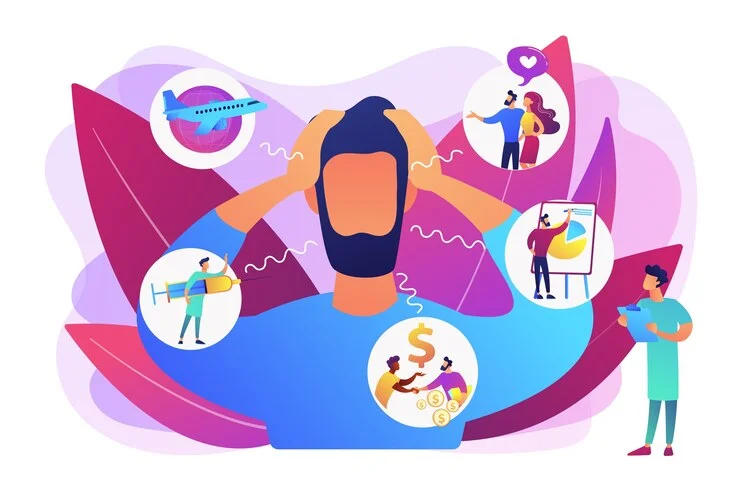
Biological Factors
- Brain chemistry: Imbalances in neurotransmitters like serotonin, dopamine, and norepinephrine can contribute to the development of depression.
- Hormonal changes: Fluctuations in hormones, such as those experienced during pregnancy, postpartum, or menopause, can increase the risk of depression.
- Medical conditions: Certain medical conditions, like thyroid disorders, chronic pain, or cancer, can contribute to or exacerbate depressive symptoms.
Environmental Factors
- Stress: Major life events, like the loss of a loved one, financial difficulties, or relationship problems, can trigger or worsen depression.
- Trauma: Experiencing traumatic events, such as abuse, violence, or natural disasters, can increase the risk of developing depression.
- Substance abuse: The use of certain substances, like alcohol or drugs, can contribute to the development of depression or make existing symptoms worse.
- Social isolation and loneliness: A lack of social support and meaningful connections can increase the risk of depression.
Genetic Factors
Research suggests that depression can run in families, indicating a potential genetic component. If you have a close family member with depression, you may be at a higher risk of developing the condition yourself.
It’s important to note that depression can often result from a combination of these factors, rather than a single cause. Understanding the potential causes and risk factors can help you better recognize and address the condition.
Diagnosis and Treatment Options
If you suspect you may be struggling with depression, it’s essential to seek professional help for a proper diagnosis and to explore available treatment options. Here’s what you can expect during the diagnosis and treatment process:
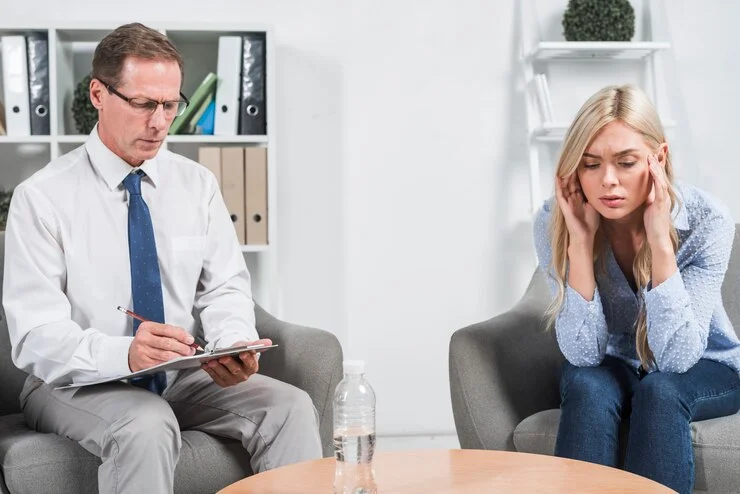
Diagnosis
To diagnose depression, a mental health professional, such as a psychiatrist, psychologist, or licensed therapist, will typically:
- Conduct a comprehensive evaluation: This involves discussing your symptoms, medical history, and any potential contributing factors.
- Administer screening tools: You may be asked to complete questionnaires or self-assessments to evaluate the severity of your symptoms.
- Rule out other potential causes: Your healthcare provider may order lab tests or physical exams to rule out underlying medical conditions that could be causing your symptoms.
Once a diagnosis of depression is made, your healthcare provider will work with you to develop an appropriate treatment plan.
Treatment Options
Depression is a treatable condition, and there are various treatment options available, often used in combination for the best results:
- Psychotherapy (Talk Therapy): This involves working with a licensed therapist or counselor to address the underlying thoughts, behaviors, and patterns that contribute to depression. Common types of therapy for depression include:
- Cognitive-Behavioral Therapy (CBT)
- Interpersonal Therapy (IPT)
- Psychodynamic Therapy
- Medication Management: Antidepressant medications can help regulate brain chemistry and alleviate symptoms of depression. Common types of antidepressants include:
- Selective Serotonin Reuptake Inhibitors (SSRIs)
- Serotonin-Norepinephrine Reuptake Inhibitors (SNRIs)
- Tricyclic Antidepressants (TCAs)
- Monoamine Oxidase Inhibitors (MAOIs)
- Lifestyle Changes: Making positive changes to your lifestyle can complement other treatments and promote overall well-being. This may include:
- Regular exercise
- Improving sleep habits
- Adopting a healthy, balanced diet
- Stress management techniques (e.g., mindfulness, yoga)
- Alternative Therapies: Some individuals may find relief through complementary or alternative therapies, such as:
- Light therapy (for seasonal affective disorder)
- Acupuncture
- Herbal supplements (under medical supervision)
- Support Groups: Joining a support group can provide a sense of community, shared understanding, and valuable coping strategies from others who have experienced depression.
It’s important to work closely with your healthcare provider to find the right combination of treatments that work best for you. Treatment for depression is not a one-size-fits-all approach, and it may take some trial and error to find the most effective plan.
Coping with Depression Day-to-Day
While seeking professional treatment is crucial for managing depression, there are also strategies you can incorporate into your daily life to help cope with the condition:
- Build a Support System: Surround yourself with understanding friends, family members, or a support group who can provide encouragement and a listening ear when you need it.
- Practice Self-Care: Make time for activities that bring you joy, relaxation, or a sense of accomplishment, even if it’s something small like taking a walk or enjoying a favorite hobby.
- Challenge Negative Thought Patterns: Depression can distort your thought processes, leading to negative self-talk and irrational beliefs. Identify and challenge these thoughts by reframing them in a more positive, realistic light.
- Set Reasonable Goals and Expectations: Break down larger tasks into smaller, manageable steps to avoid feeling overwhelmed. Celebrate small victories and don’t be too hard on yourself if you have an off day.
- Maintain a Routine: Establishing a consistent routine can provide a sense of structure and normalcy, which can be helpful when dealing with depression.
- Seek Professional Help When Needed: If you find that your coping strategies are no longer effective or your symptoms are worsening, don’t hesitate to reach out for additional professional support.
Remember, coping with depression is an ongoing process, and it’s important to be patient and kind to yourself throughout the journey.
Overcoming the Stigma Around Depression
Despite its prevalence, depression is still surrounded by a significant amount of stigma and misconceptions. Many people struggle to talk openly about their experiences with depression due to fear of judgment, discrimination, or being seen as weak or incapable.
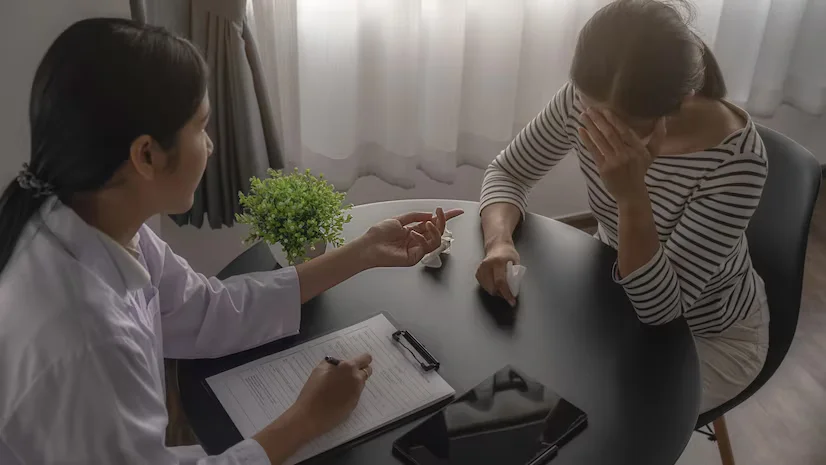
However, it’s crucial to dispel these myths and promote open and honest conversations about mental health. Here are some common myths about depression that need to be addressed:
| Myth | Fact |
|---|---|
| “Depression is just a case of feeling sad or lazy.” | Depression is a legitimate medical condition that affects a person’s mood, thoughts, behaviors, and physical well-being. It’s not a choice or a sign of weakness. |
| “People with depression should just ‘snap out of it’ or ‘cheer up.'” | Depression is a complex condition that cannot be overcome through sheer willpower alone. It requires professional treatment and support. |
| “Talking about depression or suicidal thoughts will only make it worse.” | Opening up about depression and seeking help is a crucial step in the recovery process. Keeping these feelings bottled up can be detrimental. |
| “Depression only affects certain types of people.” | Depression can affect anyone, regardless of age, gender, socioeconomic status, or cultural background. |
| “Antidepressants are a quick fix and should be avoided.” | Antidepressants, when prescribed and monitored by a healthcare professional, can be an effective part of a comprehensive treatment plan for depression. |
By challenging these myths and promoting open and honest conversations about mental health, we can help reduce the stigma surrounding depression and encourage more people to seek the help and support they need.
“The stigma around depression and mental illness is one of the last remaining shames of our society. We need to talk about it openly and raise awareness.” – Michelle Dickinson
Conclusion
Depression is a serious mental health condition that can significantly impact your life, but it is treatable. By recognizing the signs and symptoms early on, you can take proactive steps to seek professional help and find the right combination of treatments and coping strategies to manage your depression.
Remember, you are not alone in this journey. Depression affects millions of people worldwide, and there are resources available to support you. Don’t hesitate to reach out for help – it’s a sign of strength, not weakness.
If you or someone you know is struggling with depression, consider contacting the following resources:
- National Suicide Prevention Lifeline: 1-800-273-8255 (available 24/7)
- Crisis Text Line: Text HOME to 741741 (available 24/7)
- Find a local mental health professional or support group through Mental Health America or the National Alliance on Mental Illness.
With the right support, understanding, and treatment, it is possible to overcome depression and regain a sense of joy, fulfillment, and purpose in your life.
